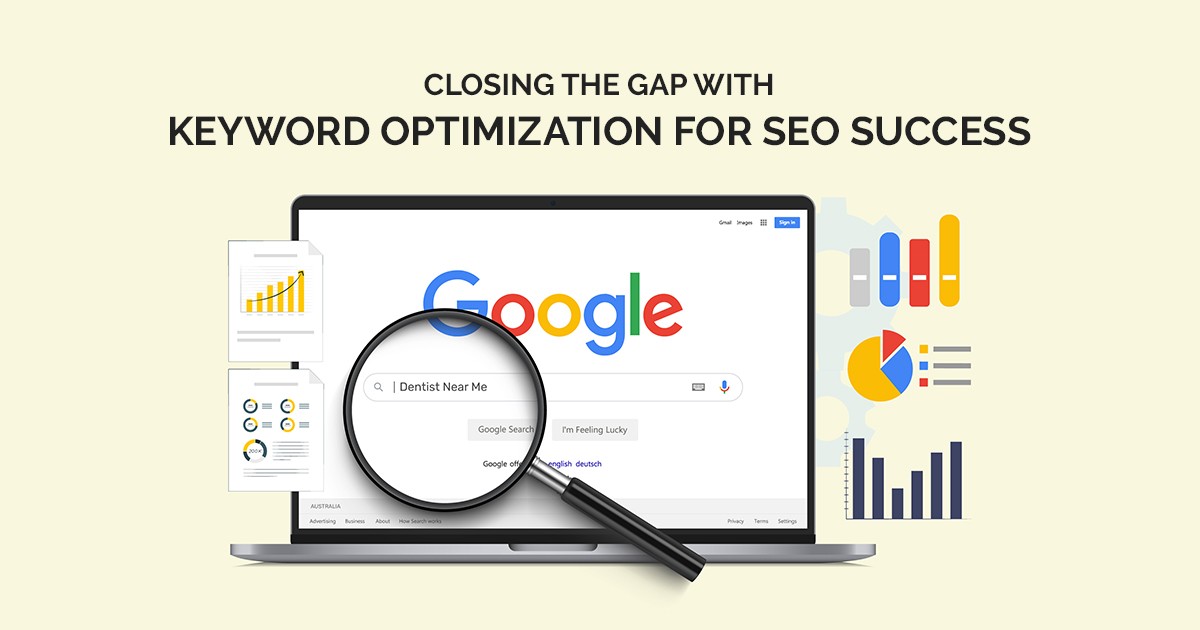
When it comes to a website's visibility and ranking in search engine results pages (SERPs), keyword optimization is crucial. But focusing only on keywords without a plan might not work to reach the intended outcome.
It's essential to understand that successful keyword optimization goes beyond simply stuffing keywords into content or meta tags. Instead, it requires a strategic approach that takes into account the search intent of users, the competitiveness of keywords, and the overall relevance of the content to the target audience. By aligning keyword optimization efforts with broader SEO objectives and user-centric principles, businesses can create a more meaningful and impactful online presence.
Furthermore, being ahead of the curve counts in the rapidly changing world of search engine algorithms. The identical strategies that worked yesterday might not work tomorrow. As a result, companies need to be flexible and quick, constantly adjusting their keyword optimisation tactics in response to algorithmic changes, market trends, and data-driven insights. Businesses can confidently go through the difficulties of keyword optimisation and achieve long-term success in the cutthroat digital market by being proactive and utilising the experience of seasoned SEO specialists like Webplanners.
That’s why today, we'll go into the idea of keyword gaps in this in-depth article, looking into how evaluating keyword opportunities and competition rankings can reveal areas that require work and promote SEO success.
Understanding Keyword Gaps
Keyword gaps refer to the disparity between the keywords your website currently ranks for and those that your top competitors dominate. By checking these gaps, you can identify untapped opportunities to enhance your keyword targeting and outperform your competitors in search rankings.
Assessing Current Keyword Rankings
Begin by conducting a thorough analysis of your website's current keyword rankings. Utilise tools such as Google Analytics, Google Search Console, and third-party SEO platforms to identify the keywords driving organic traffic to your site.
Competitor Analysis
Next, identify your top competitors in the search landscape and analyse their keyword rankings. Determine which keywords they rank highly for but are absent from your own keyword portfolio.
Identifying Keyword Opportunities
Compare your current keyword rankings with those of your competitors to identify gaps and opportunities. Look for keywords with high search volume, low competition, and relevance to your target audience that you are not currently targeting.

Bridge the gap with effective strategies for Keyword Optimization
Content Creation
Develop high-quality, relevant content targeting the identified keyword opportunities. Create comprehensive, informative articles, blog posts, guides, and other content formats optimised around these keywords to attract organic traffic and engage your audience.
On-Page Optimization
Optimise existing website pages and content to incorporate targeted keywords seamlessly. Ensure that page titles, meta descriptions, headings, and body content are all optimised for relevant keywords while maintaining readability and user experience.
Backlink Building
Earn high-quality backlinks from authoritative websites within your industry or niche to boost your website's credibility and authority in the eyes of search engines. Outreach to relevant websites and offer valuable content or collaborations to secure backlink opportunities.
Technical SEO
To achieve optimal performance and search engine indexation, address technical SEO factors including crawlability, mobile friendliness, schema markup, and website speed. Fix any technological problems that might be preventing people from seeing and rating your website highly.

Monitor and Iterate
Continuously monitor your keyword rankings, traffic metrics, and competitor movements to gauge the effectiveness of your keyword optimization efforts. Iterate your strategy based on performance data and evolving search trends to maintain competitiveness in the search landscape.
Get the best of the SEO world with expert guidance from Webplanners
For businesses looking to maximise and improve their SEO potential and close the gap with advanced keyword optimization, partnering with a seasoned SEO agency like Webplanners can yield significant benefits. With our expertise in keyword research, optimization strategies, and competitor analysis, we can help elevate your website's search rankings and drive sustainable organic traffic growth.
Conclusion
Keyword optimization is a cornerstone of effective SEO strategy, enabling businesses to enhance their visibility and competitiveness in the digital landscape. By identifying and closing keyword gaps through strategic analysis and targeted optimization efforts, businesses can unlock new opportunities for growth and success. For personalised assistance and expert guidance in keyword optimization, reach out to Webplanners today and take your SEO efforts to the next level.
FAQs
What strategies can I use to close keyword gaps and optimise my website?
Closing keyword gaps involves creating high-quality, relevant content targeting the identified keyword opportunities, optimising existing website pages for targeted keywords, earning backlinks from authoritative websites, addressing technical SEO issues, and monitoring performance metrics to refine your strategy over time.
How long does it take to see results from keyword optimization efforts?
The timeline for seeing results from keyword optimization efforts can vary depending on factors such as the competitiveness of keywords, the quality of content, and the effectiveness of optimization strategies. While some improvements may be noticeable in a matter of weeks, achieving significant SEO gains typically requires consistent effort over several months.
What role does user intent play in keyword optimization?
User intent, or the underlying motivation behind a user's search query, is an essential consideration in keyword optimization. By understanding the intent behind different search queries, businesses can tailor their content to meet user needs effectively, resulting in higher engagement, lower bounce rates, and improved search rankings.
How can Webplanners help with keyword optimization for my business?
Webplanners offer expert guidance and tailored solutions to help businesses optimise their keyword strategy, close keyword gaps, and improve their search engine rankings. Our team of experienced SEO professionals conducts in-depth keyword research, competitor analysis, and optimization strategies to drive sustainable organic traffic growth and maximise online visibility.
Suggested Read: Get Tailored SEO Strategies to Boost Your Business

